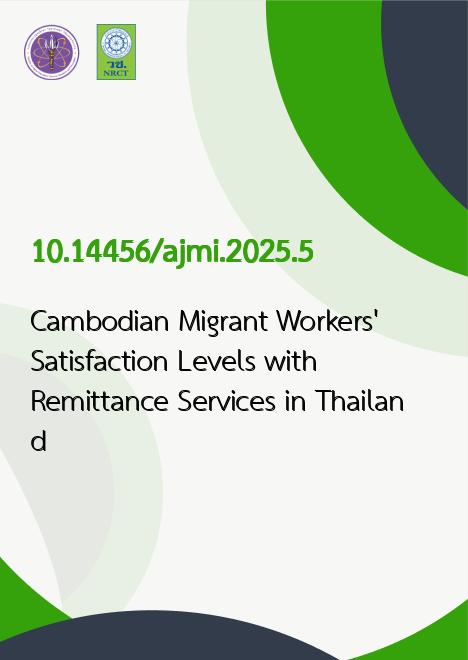
|
Cambodian Migrant Workers’ Satisfaction Levels with Remittance Services in Thailand |
|---|---|
| รหัสดีโอไอ | |
| Creator | Wandath Seng |
| Title | Cambodian Migrant Workers’ Satisfaction Levels with Remittance Services in Thailand |
| Contributor | Wayne Hamra |
| Publisher | Asia-Pacific International University |
| Publication Year | 2568 |
| Journal Title | ASEAN Journal of Management & Innovation |
| Journal Vol. | 12 |
| Journal No. | 1 |
| Page no. | 65 - 76 |
| Keyword | Cambodian migrant workers, satisfaction, remittance services, Thailand |
| URL Website | https://so13.tci-thaijo.org/index.php/AJMI |
| Website title | AJMI -ASEAN Journal of Management & Innovation |
| ISSN | 2351-0307 |
| Abstract | This research study was guided by the following objectives: 1.To examine the common remittance channels used by Cambodian migrant workers in Thailand to send their earnings home to their families;2.To investigate challenges in sending remittance to their families in Cambodia; and3.To assess Cambodian migrant workers’ satisfaction levels with remittance services in Thailand, and ask about service changes that they would view as desirable. A descriptive quantitative approach was adopted for this study; a researcher-developed questionnaire was constructed using an item-objective congruence method. Respondents were comprised of 175 Cambodian migrants employed in Thailand. The study’s findings were as follows:1. Respondents’ most commonly used remittance channels were informal agents (54%), banks (30%), and friends or relatives (11%) who hand carried funds to their families. 2. Migrant workers faced many challenges with money transfer services, the most important of which was use of unfavourable exchange rates by informal agents to calculate net remittance amounts. Many less-educated workers were unaware of this or other hidden costs, which hindered them from making informed transfer service decisions. 3. Migrant workers’ satisfaction levels with remittance channels were moderate, but they desired cheaper, faster, and more convenient options, especially less-educated workers who prioritized transaction safety and lower fees. To improve remittance service options, recommendations included financial education for workers, clearer disclosure of fees and exchange rates, diverse service options, and improved communication from providers. These changes would help to create a fairer system, allowing migrant workers to share a larger portion of their hard-earned wages with their families. |
